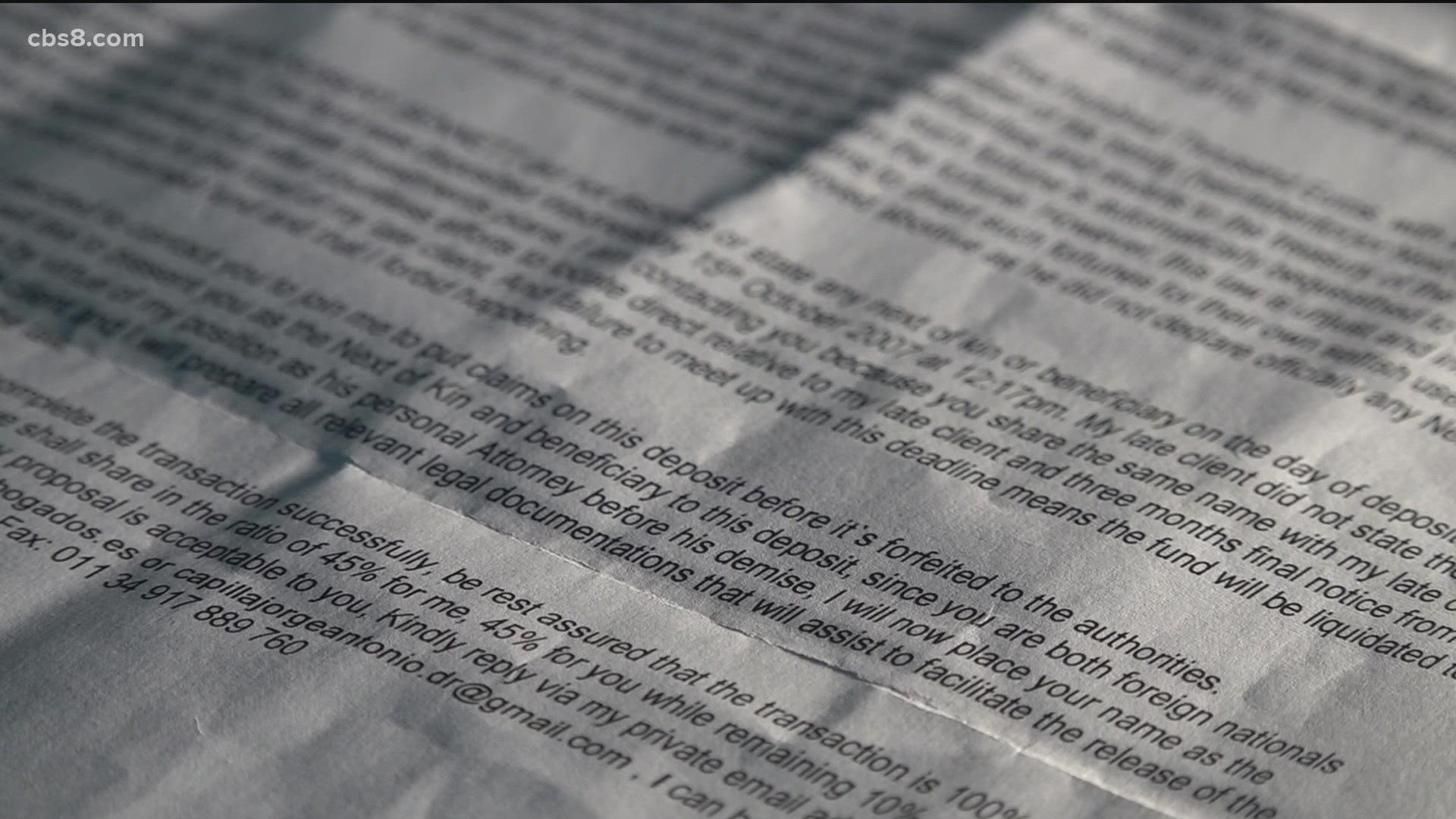SAN DIEGO COUNTY, Calif. — A Nigerian scam lands in the mail of an Escondido man. He knew right away it was a scheme but not everyone does.
The FBI says in its latest Internet Crime report (IC3) from 2020, it received a record number of internet crime complaints.
While it may be a game of whack-a-mole to track down the fraudsters, investigators are hard at work to shut them down.
When Darin Bennett opened his mail, he noticed it was postmarked from another country.
“I was thinking, 'hey I got a letter from France look at me,'” said Bennett.
But inside the envelope was a letter from a man in Spain.
“I instantly started laughing I knew it was a scam,” said Bennett.
The letterhead was marked from an attorney named Jorge Antonio Capilla Abogados, it was addressed to Darin claiming a dead distant relative named, Ken Bennett, left $6.5 million Euros in a bank in Spain.
“I have no idea and he is not related to me,” said Bennett.
The CBS 8 engineer shared it with the news department.
“If my mother-in-law got this she would be saying, 'hey is this real?' She would think it's real,” said Bennett.
CBS 8 shared it with the FBI who confirms this is an advanced fee scheme or a variation of the Nigerian letter or “419 fraud.”
“At the end of the day, the criminal is trying to get money from you,” said William McNamara, FBI Special Agent.
CBS 8 wanted to see how the scheme works. After making up a fake e-mail, we sent a message to Capilla pretending to be Darin.
We did not disclose Darin's personal information.
We made up a story on how this was perfect timing as our family is struggling with medical bills but if it were real, it could be one way to lure in a victim.
“Even by responding over email, you could be exposing yourself to greater harm, because now you've potentially given an email address,” said McNamara.
Capilla responded a day later with the same spiel but there was a red flag in the last sentence.
Capilla wanted Darin to share his occupation, marital status, date of birth, nationality and phone number and then will tell him the next step.
“That initial information they're asking for, may not be overly sensitive, but it's really just to start the correspondence,” said McNamara.
Capilla then sends an email wanting to be the limited power of attorney.
We responded in a separate e-mail that we didn’t feel comfortable about this and was nervous. But Capilla tried to assure that the information was safe.
But there were two red flags attached to the prior email. One was a copy of an ID to convince us he is who he says he is.
We googled Capilla and found an attorney website based in Spain that looked legitimate but a little more digging and there were countless claims of fraud on message boards about the Capilla letter.
Capilla also wanted us to download a form and fill it out with a copy of Darin’s passport.
“There could be and attachments or malicious code or something in that email that could be problematic for you,” said McNamara.
According to the FBI’s Internet Crime report in 2020, California ranked number one of the nearly 800,000 complaints filed in the U.S.
And a record number amounting to four billion dollars in losses.
“It's really not responding, not engaging,” said McNamara.
CBS 8 never opened the attachments and stopped communication and Capilla never wrote back.
Fortunately, Darin knew right away something wasn't right.
“If someone gets this it's not real it's a scam,” said Bennett.
The FBI says if you realized you’ve been scammed do not continue to send money.
“If you gave $500 and they come back and say, ‘We need 500 more, it gets hard for some people to realize, ‘I've been scammed. If I end this now and I walk away, I'm losing that $500. So, they think if they keep going, maybe they can recover it if they just do what the person asks,” said McNamara.
If you are a victim of fraud or if you've received a scam whether it be through the internet or the mail you are encouraged to report it to the FBI and reach out for resources.
WATCH RELATED: San Diego woman scammed | Here's how a virtual kidnapping extortion call works (February 2022)

